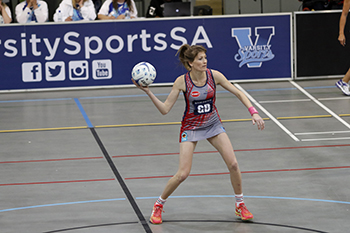
The Protea Karla Mostert, who is busy with her master’s degree
in Dietetics at the UFS, experienced a wonderful year
on the netball court. Photo: Johan Roux
Being on the Mail & Guardian 200 Young South Africans list for 2017, gives her a platform to share with South Africa what she does. This is according to Candice Thikeson. “I want to inspire people to follow their passion and pursue their dreams, and Mail & Guardian 200 Young South Africans allows me to do so.”
The art historian, who is included in the Arts & Entertainment category, is one of six current and former students of the University of the Free State (UFS) featured in the prestigious list. The others are Zola Valashiya (Civil Society), Lerato Machetela (Education), Thapelo Mokoatsi (Film and Media), Karla Mostert (Sport), and Nokuthula Sithole (Politics & Government).
Every year, the Mail & Guardian honours exceptional young citizens under the age of 35 who has made an impact in their respective fields. A special event for this year’s chosen ones was hosted at Emperors Palace in Johannesburg on 29 June 2017.
Making a statement for art historians
Thikeson, a Mandela Rhodes Scholar, Bright Young Mind, and recipient of the Abe Bailey Travel Bursary, says she feels honoured. “To me, this means that the impact I am making in the arts is being felt. There are very few art historians in South Africa, and because of this, people don’t often know what this profession entails.”
Inspiring people from all walks of life
She says the reaction from friends, family, colleagues, and acquaintances have been overwhelming. “The most heart-warming thing for me has been having men tell me that I inspire them. As women, we are often told that we are inspirations for little girls, but women can and do inspire, challenge, and motivate men too.”
She was appointed as a junior lecturer in the Department of Art History at the UFS in January. This, and being a Mandela Rhodes Scholar, is some of her career highlights. She is also enrolled for a research master’s degree in Art History and Image Studies.
UFS students on the Mail & Guardian 200 Young South Africans list:
• Zola Valashiya (Civil Society) – Co-founder and director, Debate Afrika
• Lerato Machetela (Education) – Psychologist
• Thapelo Mokoatsi (Film and Media) – Historian and academic
• Karla Mostert (Sport) – Netball player
• Nokuthula Sithole (Politics & Government) – Activist
• Candice Thikeson (Arts & Entertainment) – Art historian
View the Mail & Guardian 200 Young South Africans here.